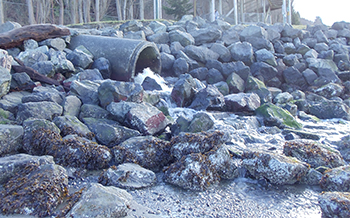Swimming tips to minimize risk
Top tip — look for BEACH swimming advisories
Many saltwater swimming beaches are regularly tested for high levels of bacteria, and local health jurisdictions may issue advisories based on these test results. Check for signs, sign up for our email list, or check our BEACH map to know before you go. If you see a sign or a notice that it is unsafe to swim, avoid water contact.
Permanent swimming advisories
The following beaches have an advisory for water-contact recreation throughout the year.
| County | Beach(es) |
| Island | Windjammer Park beach (not the Windjammer Lagoon) |
| Mason | Walker County Park |
| Pierce | Thea Foss Waterway |
| Snohomish | Edmonds Marina Beach Dog Park |
| Thurston | Squaxin Park West Bay Park |
| Whatcom | Little Squalicum Park |
Protect yourself and your family
First, do not swim at any public beach if you are already sick or if you have a weakened immune system. Also, avoid swimming for 24 hours after a heavy rainfall or anywhere you can see discharge pipes. Finally, a few hygiene tips may help you minimize your exposure to illness:
- If possible, keep your face and head out of the water or wear nose plugs and goggles.
- Don’t swallow beach water.
- Shower after swimming or recreating at a beach.
- Wash your hands before eating, especially if you’ve been playing in the sand.
Whether or not a beach is closed to swimming and water contact, it's a good idea to take precautions when playing in the sand. Bacteria that cause illness can survive longer in sand than in water. This can put children at risk if they put contaminated sand in their mouth.
If you get sick
If you believe that you are sick from swimming in contaminated waters, see your physician immediately, and contact us or your local health department to report which beach may have caused your illness.
Avoid swimming near stormwater outfalls to minimize risk of illness.


